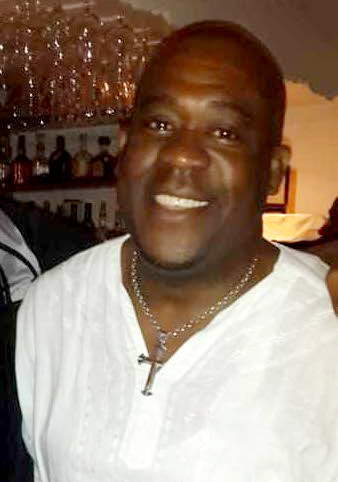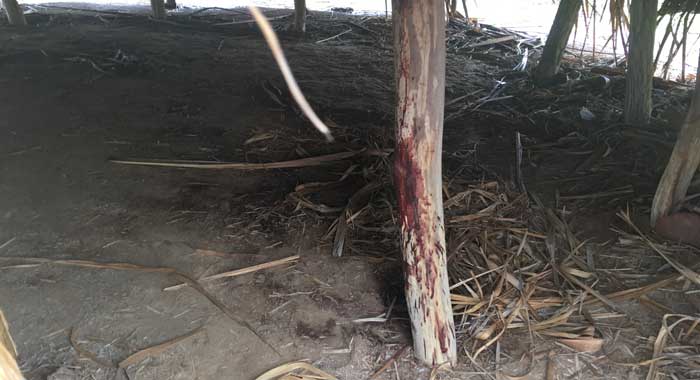Man gets 31 years for killing bishop who raped him

A man who chopped to death a pastor, who had drugged and raped him and infected him with HIV, has been jailed for 31 years.
Justice Brian Cottle handed down the sentence on Anwar Jack, 26, of Georgetown, at the High Court, in Kingstown, on Tuesday, in what he said was “a most unfortunate case”.
As of Tuesday, Jack– who is bipolar and suffers from antisocial personality disorder — had spent two years, three months and 27 days on remand.
Therefore, he has to serve a further 28 years, eight months and three days in prison.
The judge also ordered that during Jack’s incarceration, he received counselling to assist him in his rehabilitation and that the state provided him with the medication he needs, at no cost to him.ng down the sentence, Justice Cottle noted that the court has sentencing guidelines that it must follow, and when they are applied judges “arrive at positions that without those guidelines we might not have arrived at.
“But it is not my place to make legislation,” Justice said, adding that the court must apply the legislation.
On Nov. 9, Jack pleaded guilty to a charge that he murdered Enoch, 50, at Argyle, sometime between 8 p.m. on Aug. 17, 2018 and 10:40 a.m. on Aug. 18, 2018, by chopping him about his body with a cutlass.

The body of Enoch, a travel agent supervisor, of Brighton, originally of Trinidad, was found wrapped in a sheet at Argyle on Aug. 18, 2018.
The nude body of the Spiritual Baptist bishop and pastor of the Mt Carmel Spiritual Baptist Church, at Chester Cottage, had a condom on the penis.
The body was found after Jack told police he had chopped Enoch to death during a homosexual encounter and led police to where the body was found in a hut in a re-created Carib village in a secluded area near the Argyle International Airport.
On the night of his death, Enoch had told his wife of eight years and her son that he was going to a birthday party — which, according to Jack’s lawyer, Grant Connell, Enoch never attended.
Before Jack chopped Enoch to death, they had had sex twice, and Enoch was putting on a condom for a third round when Jackson reached for a cutlass he had hidden at the scene and chopped Enoch repeatedly about the head and face.
He then watched as Enoch took his last breath before driving away in the deceased man’s vehicle.
Jack had acted on a decision he had made some time after Enoch violated him and pressured him into a homosexual lifestyle.
Drugged and raped
Mitigating on Jack’s behalf, Connell chronicled how Jack had come into contact with Enoch who had helped him to land a job.
Through the lawyer’s account, as well as the facts presented by the judge, iWitness News is able to paint a picture of the circumstances surrounding Enoch’s murder.
Jack, a former “churchgoer”, is the eighth of nine children in a close-knit family in which he was instilled with “good moral values” and his parents tried their best amidst socio-economic hardships.
He graduated from the Georgetown Secondary School and worked as a vendor, labourer, handyman, shop attendant, and his last job was as a security guard.
Jack’s lawyer pointed out that Enoch, on the other hand, was “a happily married man”, who worked as a supervisor at Going Places Travel and was a spiritual Baptist bishop and pastor.
He lived with his wife, Tecla Pompey-Enoch, and his stepson and her nephew.
Jack had met Enoch while the younger man was working at a bakery, a job he later lost, and Enoch offered to help him to secure new employment.
Enoch invited Jack to his office to collect information for the job application and Jack, “in his innocence and desperation” went to the office, the lawyer said.
At the office, Enoch placed a call to “a well-renowned security firm” of which he was a customer and began the process of securing the job for Jack.
Jack accepted a drink that Enoch had offered.
“After taking the drink, in his very first visit to the office, he passed out,” Connell told the court, adding that when Jack came to, he felt something was wrong.
“His anus was burning; boxers rolled up and his pants waist was higher than usual,” the lawyer said.
Enoch, who had drugged and raped Jack, gave him EC$50 to help with the documents to secure employment.
“According to my instructions, the deceased told [Jack] it’s the best sex he ever had,” the lawyer said, adding that Enoch further told Jack that he wanted to see him again and wanted to be in a relationship with him.
He said that Jack indicated from the beginning that he was “not like that” and tried his best to stay away from Enoch.
In his efforts to do so, he changed his telephone number.
And while he worked as a security guard in Owia, Jack continued to vend so as to help his family, including selling watermelon in Kingstown.

Years of pursuit; decision to kill
Enoch continued to pursue Jack for several years until early 2018 when Jack met Enoch on the streets of Kingstown. Enoch accused him of ingratitude and again propositioned him.
Several days later, Jack’s phone rang and it was Enoch on the other end, saying that someone had given him Jack’s number.
Enoch again propositioned Jack for a relationship, and Jack threatened to report the rape to the police.
“And he was told, ‘You know who I am? You know who you are? I could afford lawyer. What you could afford?’” Connell told the court.
“He pursued him until he conquered,” the lawyer said.
And, in light of what Enoch had said about Jack’s low social standing and the unlikelihood that anyone would believe that Enoch had raped him, Jack decided on revenge.
The judge said that the two men would meet at various places during the months preceding the killing.
During these meetings there will be sexual intimacy and Enoch encouraged Jack to adopt homosexuality as a lifestyle and tried to force him into having sex with other men.
Jack, however, refused and also tried to refuse the money and the gifts that Enoch offered, and formed the view that Enoch will never leave him alone.
Jack, therefore, decided to take matters into his own hands.
Connell praised the “meticulous, detailed” investigation of Detective Sergeant Bristol, adding that through her investigation, he was able to “draw some nexus” between Jack’s claims and what actually happened between him and Enoch.
The lawyer said that the detective’s investigation shows that Enoch and a young man, “coincidentally in security guard uniform”, visited Enoch’s house on various occasions, sometimes two or three times a week.
He said that “coincidentally” there were visits by Enoch and Jack, in his security uniform, to a hotel in Villa.
The investigation, the lawyer said, found sheets and pillows at Enoch’s workplace.
“The sheets and pillows at his office were only the tip of the iceberg as to his apparent salacious behaviour,” the lawyer said.
He said that Jack provided to the police, the full chronology of his relationship with Enoch, including the arrangements that were made for Enoch to meet him at The Carib Village in Argyle, where he murdered the cleric.
At the Carib Village, Enoch was preparing to have sex with Jack for a third time that night, when Jack retrieved a cutlass he had hidden there beforehand and chopped Enoch across the head and face several times.
The killer was motivated in his actions by his feelings of self-loathing and blamed Enoch for having caused him to contract HIV and felt that he had no other choice but to act as he did, the judge said.
Jack watched as Enoch took his last breath then took the deceased man’s vehicle and phone and drove away.
He ran off the road in Calliaqua and abandoned the vehicle there.

‘He had killed me already’
In the meantime, when, at 1 a.m., Enoch had not returned home, his wife became worried, having failed in her efforts to reach him via his mobile phone.
She and some of her neighbours set out to look for Enoch and found his vehicle ransacked and abandoned at Calliaqua.
She reported this to the police.
But, some hours later, about 4:10 a.m., police officers met Jack walking in the rain in Fair Hall and questioned him.
He said he was going to Georgetown — located some 15 miles away.
Because of his responses, the police took Jack into custody, and found a knife in his possession.
About five hours later, Jack told police he had killed Enoch by chopping him with a cutlass and took the police to Argyle, where he pointed out a hut in which the body was found.
Connell said that Jack had left Enoch’s body wrapped in sheets and other
“accoutrements that were the regular extras”.
At the entrance to the hut, the police recovered a concealed cutlass, wrapped in plastic, which Jack told them was the murder weapon.
The post mortem revealed that Enoch had died of multiple chop wounds and was HIV positive.
Jack’s HIV test produced similar results.
Before his encounter with Enoch, Jack, at age 20 began engaging in consensual, heterosexual relationships.
One girlfriend was considerably older than Jack and the relationship fell apart when he found out that she had been cheating on him and was only interested in the material support he could provide her and her children.
As a result of this, Jack began experiencing symptoms of depression and was being treated with Prozac, an antidepressant drug, which he was still taking when he murdered Enoch.
Jack’s lawyer, however, said that his client’s actions had taken a sudden twist “after his first interaction with the bishop”.
The lawyer said that Enoch had told his friend of “his new acquisition and even invited a friend — it was not a ménage à trois, but the friend did likewise to Anwar, adding to his emotional trauma”.
The lawyer said that when Jack had said of Enoch, “He had killed me already” and that he almost could not live with himself because of what Enoch had done to him.
The lawyer said that Jack later learned that Enoch was also involved with other men.
“He got to find out that he was HIV positive,” the lawyer said, noting that this is proven by the HIV positive tests results of both men, which were before the court.
“It is often said that HIV is not a death sentence. That is very easy to say when one is in a position to afford the many cocktails and extensions,” the lawyer said, adding that when one comes from the “bosom of poverty”, as he had said was the case with Jack, it is a “horror story”.

‘the circumstances are ones that cry out for leniency’
Regarding Jack’s sentence, Connell said that the pillars of criminal sentencing are well known and that Jack’s offence is “a very serious one but the circumstances are ones that cry out for leniency”.
He said that with a loss of a life, the offence must be punished so as to reflect society’s abhorrence.
He, however, said that Jack was a relatively young man and Enoch was a bishop.
“He preached from a pulpit — obviously not a saint in society, obviously did not practice what he preached,” the lawyer said.
He said what an adult does behind closed door is his choice “but if the bishop had practised what he preached from the pulpit, using the good book, the Bible, as his rudder in life, he would have been guided as to the Sodom and Gomorrah effect.”
The lawyer said he had put the factual matrix before the court, adding that the emotional trauma that Jack was put through is a mitigating factor in the case.
The lawyer said that while the Mental Health Centre had provided a psychiatric report, he had seen far more detailed psychiatric evaluation.
The report speaks of Jack’s history of visiting the Mental Health Centre, his having no hallucination, and then a conclusion.
“My lord, Anwar Jack is now to be sentenced. The deceased, Bishop Enoch, he who was supposed to have a level of trust, Anwar looked up to this man; he was a bishop. Bishop Enoch was supposed to pray for him, but instead, he made him his prey.”
Connell said that Jack, in his own words, said, “I am very, very sorry but he bring it on himself. He forced me. I’m sorry that it happened. I am even sorrier for his wife and children but when he was doing me that, he shoulda think ah he wife and family too.”
The defence counsel told the court that when he had asked for an adjournment in the sentencing on Monday, he spoke to Jack at the prisons and in his practice, has never heard a defendant put it that way.
“He said, ‘I am ready to go before Justice Cottle to get my sentence. Well, my second sentence, whichever one lasts longer.’”
The lawyer said every effort was made to get counselling for Jack and he was certain that there are many good people in the society who will assist, given Jack’s HIV status and the stigma attached to it.
The lawyer said that the defence was asking mercy for Jack but was not trying to trivialise the loss of life.
“But Bishop Enoch was no ordinary man. He abused his position. He did not practice what he preached.
“… God is good, and the great god above, after you have imposed a sentence, hopefully, he will be alive to serve it….
“And God only hope that the approach to the treatment of HIV in that institution is better than the society,” the lawyer said in an apparent reference to last week’s prison break, in which accused murderer Veron Primus escaped for the second a second time in just over a year and another accused murderer also escaped.
Both fugitives were recaptured about 30 hours after they were found missing.
Connell said he hopes that the issue would be addressed of desperate young males and females having to “succumb to this kind of abuse by sexual predators”.
Court not condoning homophobic violence
In handing down his sentence, Justice Cottle repeated and explained the aims of criminal punishment, namely prevention, deterrence, retribution and rehabilitation.
He said that Jack is still relatively young and it is hoped that he could be rehabilitated during his incarceration, adding that Jack’s HIV is being managed by anti-retroviral medication.
The judge said that the social inquiry report had included the views of the defendant and his family members, prison authorities, his secondary school, former employers, as well Enoch’s widow and other relatives.
Jack’s has behaved excellently while in prison.
His family members said they were unaware of his homosexual activity, but some community members said they suspected it.
In Jack’s neighbourhood, he was seen as quiet and hardworking and there was universal surprise that he had run afoul of the law.
Enoch’s widow was antagonistic when interviewed by the social worker.
Her husband had been the breadwinner of the family and his death has resulted in financial hardships for his widow and stepson, including the widow’s inability to meet mortgage payments on her own.
The widow feels a keen sense of loss of her husband, who she said was always caring towards her.
The judge noted that the court must follow the sentence guidelines, which offer, in its range, a death sentence, a whole life sentence, a determinate sentence, detention by the court when the offender suffers from some relevant mental illness, or detention at the court’s pleasure.
The guidelines say that since Jack pleaded guilty, the court should impose a determinate sentence.
And while the degree of planning and premeditation in Jack’s killing of Enoch would normally merit a whole life sentence, the guilty plea meant that the court should impose a determinate sentence.
The judge began with a starting point of 40 years imprisonment.
He said that aggravating features of the case include the use of a bladed weapon that Jack had concealed at the scene beforehand, and multiple wounds were inflicted.
There was a significant degree of planning and premeditation.
Mitigating features are that Jack was a young man at the time of the offence and had no previous convictions.
He confessed at an early stage and gave significant assistance to the police in their investigation.
The judge said there was no sudden loss of control to substantiate ground for provocation.
He, however, saw as a mitigating feature the fact that Enoch had drugged and buggered Jack and continued to make unwanted sexual advances in “the particularly homophobic society” that is St. Vincent and the Grenadines.
The judge, however, said that it must not be thought that the court is condoning violence against persons simply on the basis of their perceived sexual orientation.
He said the court found the background of non-consensual homosexual intercourse and the continued unwanted advances by Enoch to be significant feature of the case.
The court also took into account the fact that at the time Jack was being treated for depression.
The judge concluded that this was not enough to affect Jack’s mental responsibility for his action but was a factor that could be considered at sentencing.
The judge concluded that the mitigating features outweigh the aggravating features and reduced the notional sentence by nine years.
He, however, said that the sentencing guideline mandate that where a starting point of a determinate sentence is chosen because of a guilty plea, there should be no further discount on account of that guilty plea.
—IWN




